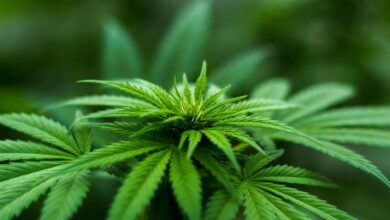Difference Between Cbd Thc

Cannabidiol (CBD) and tetrahydrocannabinol (THC) are two prominent cannabinoids found in cannabis. Their chemical structures lead to distinct properties and effects. THC is known for its psychoactive effects, while CBD is recognized for its therapeutic potential. This divergence influences public perception and legal frameworks surrounding their use. Understanding these differences is essential for navigating the evolving landscape of cannabinoid research and regulation. What implications do these distinctions have for consumers and policymakers alike?
Chemical Structure and Properties
In examining the chemical structure and properties of cannabidiol (CBD) and tetrahydrocannabinol (THC), it becomes evident that these two cannabinoids, while derived from the Cannabis sativa plant, exhibit distinct molecular characteristics.
CBD's molecular composition features a hydroxyl group, whereas THC contains a cyclic structure.
These differences influence their chemical interactions within the body, leading to varied physiological effects and potential therapeutic applications.
Psychoactive Effects
Psychoactive effects represent a significant distinction between CBD and THC, influencing their respective uses and societal perceptions.
THC possesses notable psychoactive properties, leading to various mental effects such as euphoria and altered perception.
In contrast, CBD lacks these psychoactive properties, resulting in no intoxicating effects.
This fundamental difference shapes public attitudes, with THC often associated with recreational use and CBD perceived as a wellness option.
Therapeutic Benefits
Therapeutic benefits of CBD and THC are increasingly recognized within both medical and wellness communities.
CBD is often associated with pain relief and anxiety reduction, making it a popular choice for those seeking non-psychoactive options.
Conversely, THC provides distinct pain relief and potential anxiety reduction, though its psychoactive properties can deter some users.
Understanding these differences is crucial for informed choices regarding treatment options.
Legal Status and Regulations
While both CBD and THC derive from the cannabis plant, their legal status and regulations vary significantly across jurisdictions.
CBD often enjoys broader acceptance due to its non-psychoactive nature, while THC faces stringent restrictions.
These differing legal frameworks create regulatory challenges that affect accessibility and consumer rights, revealing the complexities of cannabis legislation and the ongoing need for clarity in the evolving landscape.
Conclusion
In summary, the distinction between CBD and THC reflects a nuanced landscape of chemical composition and societal perception. While THC is often associated with recreational enjoyment and altered states of consciousness, CBD offers a more subdued alternative, appealing to those seeking relief without the accompanying euphoria. This divergence not only shapes individual preferences but also influences regulatory frameworks, underscoring the ongoing dialogue surrounding the benefits and implications of these two prominent cannabinoids in contemporary society.






